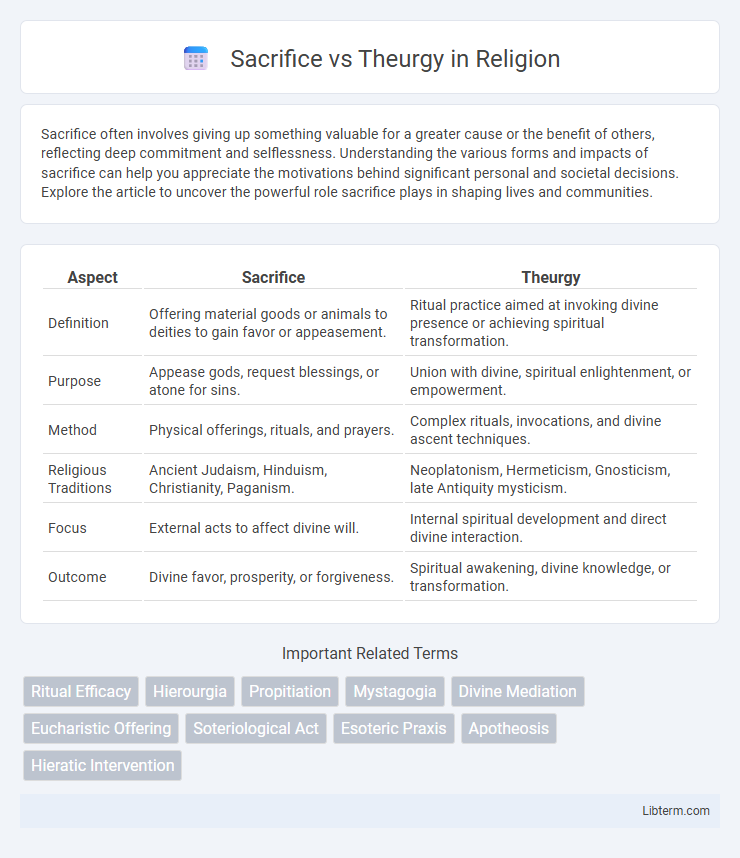Sacrifice often involves giving up something valuable for a greater cause or the benefit of others, reflecting deep commitment and selflessness. Understanding the various forms and impacts of sacrifice can help you appreciate the motivations behind significant personal and societal decisions. Explore the article to uncover the powerful role sacrifice plays in shaping lives and communities.
Table of Comparison
| Aspect | Sacrifice | Theurgy |
|---|---|---|
| Definition | Offering material goods or animals to deities to gain favor or appeasement. | Ritual practice aimed at invoking divine presence or achieving spiritual transformation. |
| Purpose | Appease gods, request blessings, or atone for sins. | Union with divine, spiritual enlightenment, or empowerment. |
| Method | Physical offerings, rituals, and prayers. | Complex rituals, invocations, and divine ascent techniques. |
| Religious Traditions | Ancient Judaism, Hinduism, Christianity, Paganism. | Neoplatonism, Hermeticism, Gnosticism, late Antiquity mysticism. |
| Focus | External acts to affect divine will. | Internal spiritual development and direct divine interaction. |
| Outcome | Divine favor, prosperity, or forgiveness. | Spiritual awakening, divine knowledge, or transformation. |
Understanding Sacrifice: Historical Perspectives
Ancient civilizations practiced sacrifice as a ritual offering to deities, aimed at securing divine favor or appeasement, often involving animals or valuable goods. Historical records from Mesopotamia, Egypt, and Greece reveal sacrifices as central to religious ceremonies, symbolizing communication and exchange between humans and gods. Theurgy, unlike sacrifice, emphasizes invoking divine presence through sacred rites, focusing more on spiritual transformation than transactional offerings.
Defining Theurgy: Origins and Evolution
Theurgy, originating in Neoplatonism during the 3rd century CE, is a spiritual practice aimed at invoking divine powers through rituals to achieve mystical union and enlightenment. Unlike sacrifice, which traditionally involves offering material goods to appease deities, theurgy emphasizes a transformative process connecting the practitioner directly to the divine essence. Its evolution reflects a synthesis of Platonic philosophy and Hellenistic religious customs, distinguishing it as a contemplative and theologically rich discipline.
Core Differences Between Sacrifice and Theurgy
Sacrifice involves offering something valuable, often material goods or living beings, to deities to gain favor or appease supernatural forces, emphasizing a transactional relationship between humans and gods. Theurgy, by contrast, is a spiritual practice aimed at invoking divine presence within oneself through rituals and meditations, seeking transformation and union with the divine rather than external rewards. Core differences lie in sacrifice's external, often physical offerings versus theurgy's internal, mystical engagement with divine energies.
Philosophical Foundations of Sacrifice
Sacrifice in philosophical terms represents an ontological act symbolizing the voluntary renunciation of something valuable to transform or communicate with the divine realm. Rooted in ancient metaphysics, sacrifice embodies the principle of exchange, where material offerings mediate between mortal existence and transcendent realities, reflecting a fundamental belief in reciprocity and cosmic order. Theurgy, contrastingly, emphasizes ritual practices aimed at invoking divine presence or powers, but sacrifice remains a primal foundation illustrating humanity's existential negotiation with transcendence through symbolic gestures.
The Mystical Framework of Theurgy
Theurgy operates within a mystical framework that emphasizes divine invocation and spiritual transformation through rituals designed to unite the practitioner's soul with higher intelligences or deities. Unlike sacrifice, which often involves offering material goods to appease gods, theurgy seeks internal elevation and enlightenment by aligning human consciousness with cosmic principles. This practice is rooted in Neoplatonic philosophy, where ritual actions serve as symbolic acts to transcend material limitations and achieve spiritual purification.
Sacrifice in World Religions
Sacrifice in world religions functions as a ritual offering to deities or spiritual beings, symbolizing devotion, appeasement, or a request for blessings. Prominent in Hinduism, ancient Judaism, and indigenous traditions, sacrifices often involve animals, food, or symbolic objects, serving as a tangible exchange between humans and divine forces. Theurgy, by contrast, emphasizes invoking divine presence through spiritual practices rather than material offerings.
Theurgy in Esoteric Traditions
Theurgy in esoteric traditions represents a spiritual practice aimed at invoking divine energies to achieve personal transformation and enlightenment. Unlike sacrifice, which often involves offering material goods or rituals to appease deities, theurgy emphasizes direct communion with higher spiritual powers and the activation of inner divinity through rituals, meditation, and symbolic acts. Central to Neoplatonism and Hermeticism, theurgical practices seek to transcend the mundane and unite the practitioner with cosmic or divine forces for spiritual elevation.
Purpose and Intent: Contrasting Ritual Goals
Sacrifice aims to appease deities or spirits through offerings to gain favor, protection, or blessings, reflecting a transactional intent. Theurgy seeks direct communion with divine forces to achieve spiritual transformation and enlightenment, emphasizing inner transcendence over external gain. These contrasting goals highlight sacrifice's focus on material or worldly benefits versus theurgy's pursuit of mystical union and personal divinity.
Modern Interpretations of Sacrifice vs Theurgy
Modern interpretations of sacrifice emphasize symbolic acts of offering that foster personal transformation and communal connection, moving beyond traditional ritualistic boundaries. Theurgy is increasingly viewed as a spiritual practice aimed at invoking divine presence and achieving mystical union through meditative rituals and invocations. Contemporary spiritual scholars highlight the complementary roles of sacrifice as surrender and theurgy as divine partnership in the pursuit of enlightenment.
Integrating Sacrifice and Theurgy Today
Integrating sacrifice and theurgy today involves combining ritual offerings with divine invocation to enhance spiritual connection and transformation. Modern practitioners use sacrifice symbolically, offering elements like prayer, meditation, or creative acts to invoke theurgic energies and foster personal empowerment. This integration creates a dynamic spiritual practice that honors tradition while adapting to contemporary metaphysical needs.
Sacrifice Infographic

 libterm.com
libterm.com